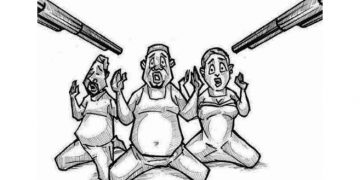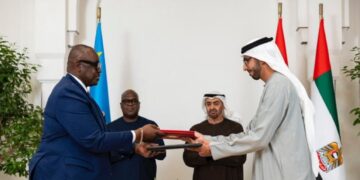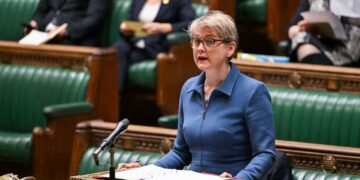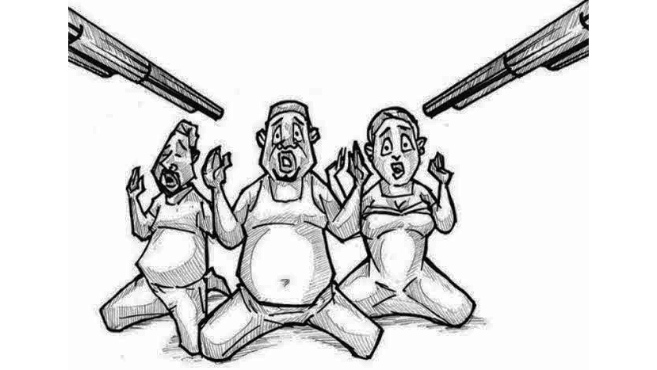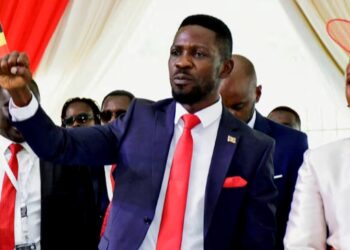By Olusegun Adeniyi
I breezed in and out of Lagos yesterday to deliver the lecture at the ‘press Week’ of the Nigeria Union of Journalist (NUJ) Lagos Chapter, with the theme, ‘Nigeria and Nation Building: Overcoming the Challenges of Restructuring and Self Determination for Progressive Development’. Since the event held at Ikeja, I was oblivious to all the drama on the Island where some EndSARS protesters were marking the first anniversary of the Lekki shooting which last October ushered in a train of events that eventually shattered the peace of the country. It was only when I was being taken back to the airport and calls came in about some arrested journalists that I became aware of what was going on.
Last night I watched some disturbing videos. They confirm the late Professor Claude Ake’s thesis in his book, ‘Democracy and Development in Africa’. The penchant by officers of the law to use unrestrained force when dealing with innocent civilians, Ake had argued, can be understood from the character of the Nigerian state which, perhaps because of its colonial heritage, has “continued to be totalistic in scope” while relying on police and other security agencies “for compliance on coercion rather than authority.”
Sadly, such recourse to brutality is prevalent everywhere and has become a threat to national security. During the question-and-answer session that followed my presentation in Lagos yesterday, one of the participants, Dr Chinyere Amaechi, asked, ‘How many countries do we have in Nigeria?’. She shared the experience that necessitated the question.
According to Amaechi, she travelled to her home state of Imo on 27th August but on getting to Asaba, Delta State capital, at about 6.30PM, the driver declared that he could not continue the journey. “We were compelled to spend an unscheduled night in Asaba. Many other vehicles soon joined us,” said Amaechi who explained how the security situation had generated such that vehicles no longer ply Southeast roads after nightfall. “But it was on my return journey on 30th September that we experienced real humiliation. As we got close to Nnewi in Anambra state, we were ordered to disembark from the vehicle to do about five minutes’ walk ahead of our vehicle which had to cross empty for security inspection. It reminded me of my trip to Ghana when we had to alight to cross the borders while our travel documents were checked. I could not help but think aloud: how many countries do we have in Nigeria if different states are guided by different security policies?”
The federal government may argue, and quite correctly, that the security crackdown in the Southeast is a response to series of attacks on private and public assets including prison facilities, Independent National Electoral Commission (INEC) offices and police stations. I understand why such lawlessness cannot be allowed to continue. But ignoring the outcry over the excesses of the police/military and other security outfits in their violations of basic human rights is counterproductive. Besides, despite their massive presence, the wave of violence and general insecurity does not seem to have abated in any significant sense.
The federal government must understand that the variant of insecurity that we are dealing with in the Southeast requires more than muscles. To get the vital information that would assist in tracking down the criminal elements who threaten lives and livelihoods, the authorities need to secure the confidence of the people. That would not happen in a milieu in which they feel victimized by those brought in to restore order. The time has therefore come to examine the wisdom of the current security structure in the Southeast.
Meanwhile, below is my presentation at the NUJ, Lagos Chapter, event: https://www.thisdaylive.com/index.php/2021/10/20/rebuilding-nigeria-for-peace-and-progress/
The Yar’Adua Study on Subsidies (II)
Shortly before the 2011 general election which he lost to President Goodluck Jonathan, then candidate Muhammadu Buhari (now president) was dismissive of subsidy in the downstream sector of the petroleum industry. “If anybody says he is subsidising anything, he is a fraud. So all these people talking about subsidy, who is subsidising who?” he famously asked. That populist position by the president may have now been tempered by reality, but it is shared by many Nigerians. Therefore, as I continue the series I started last week on the report of a study conducted by the late President Umaru Musa Yar’Adua on subsidies in five sectors (power, education, health, agriculture and petroleum), I want to reiterate that my intention is not to fly any kite but rather to provoke a conversation about the direction of our economy and how to get critical sectors to work.
I am quite aware that proposing the removal of subsidies is difficult under the current circumstance. Last Sunday, PUNCH newspaper published a breakdown of what the Federal Inland Revenue Service (FIRS) intends to spend in 2022. It is beyond scandalous. Beginning with N2.8 billion for “uniforms and clothing” it includes N550 million for refreshments, N262.5 million for security votes and a whopping sum of N17.8 billion reserved for “miscellaneous” expenses. Besides the N1.4 billion for electricity charges, N460 million on telephone charges and N1.3 billion on security services, other budgetary items include N2.5 billion for the purchase of land, N3 billion for office furniture, N1.5 billion for photocopying machines, N2.04 billion for computers, N500 million for the construction of sports facilities, N6 billion on new headquarters, N2 billion to purchase new vehicles, N1.3 billion for cleaning and fumigation, N1.4 billion on general maintenance services, N1.3 billion for office stationery, another N3 billion on printing non-security documents while a cumulative sum of N1.8 billion will go for the fueling, maintenance and purchase of new generators.
By the time you tally the inordinate amounts of money one federal agency that produces nothing will spend on non-essentials, the only conclusion to draw is that of misplaced priorities. And with that, it becomes difficult for anybody to canvass removal of subsidy in any sector until there is responsible governance anchored on transparency and accountability. But there are still challenges for which we must begin to fashion enduring solutions. Today, I continue with the aspect of the Yar’Adua 2008 report that deals with subsidy in the education sector:
As last week, the narrative was extrapolated from bullet points and charts. The only aspect I removed are figures of all the monies released to the National Universities Commission (NUC), National Commission for Colleges of Education (NCCE) and National Board for Technical Education (NBTE) both for recurrent and capital expenditures between 1999 to 2007 or the Education Trust Fund (ETF) interventions for those years.
=================================
As at the end of December 2007, a total of 50,800 primary schools, 11,025 secondary schools and 273 tertiary institutions consisting of 92 universities, 181 polytechnics and colleges of education existed in the country. 27 of the universities were federal, 31 were state-owned while the remaining 34 were private universities. Enrollment in primary schools rose from 17.9 million in 1999 to 22.8 million in 2006 and 23.5 million in 2007. Likewise, enrollment in secondary schools recorded a substantial increase from 3.8 million in 1999 to 6.7 million in 2007.
In Nigeria, the federal government has for decades been committed to tuition free policy in public primary schools, federal secondary schools, and federal tertiary institutions. Ordinarily, the modalities of financing higher education include budgetary transfers, use of voucher either direct to students/ or schools, designing Student Loan Scheme and the use of scholarship schemes as complementary or a combination of all. A breakdown reveals that expenditure on tertiary education accounted for an average of 70.8% of total Federal Government education expenditure between 1999 and 2005. Capital projects of schools is funded by the Education Trust Fund (ETF). Companies assist by paying 2 per cent after tax.
The highest percentage of federal government expenditure spent on education was in 1999 at 10.7%. In 2000, it was 6.1%, in 2001, it was 5.4%, in 2002, it was 2.9%, in 2033, it was 4.9%, in 2004, it was 3.9%, in 2005, it was 3.7 percent, in 2006, it was 7.4% and in 2007, it was 8%. It must be noted however, that even though the percentages declined, the quantum of money was on the increase.
Intervention by the federal government on higher education has been funded through the award of scholarships to deserving students at both undergraduate and post-graduate levels. The number of awards given usually depends on the amount of fund available in the budgetary provision and therefore, varies from year to year. For five years between 1999 and 2003, the number of scholarships awarded totaled 32,141 with the following breakdown: 1999, (108); 2000, (108); 2001, (10811); 2002, (14253) and 2003, (6861). There were no awards in 2004, 2005, 2006 and 2007, due to lack of funds.
The arguments for untargeted subsidies in higher education include the need to promote access to all, graduates pay for their higher education through their subsequent higher taxes, it is immoral to charge for higher education, the strong belief that higher education is a right and should therefore attract a minimum of free tuition and mass tertiary education is essential for national growth etc. Going by statistics from the federal ministry of education, the unit cost of training a Monotechnics student was N63,000 whereas they paid N10,500 leaving a fees gap of N42,500 (67.5%). For a Polytechnics student, the unit cost was N76,500 while the average fees paid was N8,500 leaving a fees gap of N68,000 (89.5%). For Colleges of Education, the unit cost was N70,000 while each paid N8,000, leaving a fees gap of N62,000 (88.06%). In public universities the unit cost was N332,000 whereas they paid N9,000, leaving a fees gap of 323,000 (97.3%).
Evidence indicate that resources are not optimally used at the school level. Often, the mix of purchased inputs (teachers’ services and other materials) is inefficient. Another major area of ineffectiveness is that administrators, students, and parents play only a marginal role in determining – indirectly through their choice of schools – how school resources are to be allocated. The current financing arrangement has not encouraged competition among the schools in the higher education sub-sector. The inefficiencies in student selection are also partly attributable to the present financing arrangements and we can look at the example of two counties.
CHILEAN MODEL: During the 1980s, the Chilean military government initiated a reform programme in the school system to improve the quality of state-financed primary and secondary education. The reform brought about a radical change by shifting the responsibility for financing tertiary education from the state to families. Consequently, state funding of tertiary education was gradually reduced from about 100 per cent in 1980 to 41 % by 2000. Universities were allowed to raise fees to augment the reduced direct transfers from government, while a state loan programme with subsidized interest rates was introduced. Scholarships that provide moderate living expenses were also introduced for the extremely impoverished students.
UNITED STATES MODEL: The United States has a highly decentralized education system which is administered by the state governments. Education policies are formulated by the state and local districts instead of the Federal Government. Higher education funding is done largely through student tuition and fees, with private institutions generally charging more than public institutions. The largest student loan scheme administrator in the country is the Federal Family Education Loan Program (FFELP). This is a loan guarantee programme: Stafford loans, directly made to students, Parents Loan for Undergraduate Students (PLUS), which are made to parents and certain graduate students, and Consolidated loans
LESSONS FOR NIGERIA: It is both efficient and equitable that students should bear part of the costs of their studies. Cut expenses on tertiary for the development of primary and junior secondary schools on competitive basis. Student loan schemes should be designed and adopted for funding the expenses of tertiary education system. Scholarship management should be decentralized to the university for the benefit of the targeted groups. Tuition fees in tertiary institutions relax the supply-side constraint and it encourages private sector participation. There is a need for a New Framework for Subsidy Implementation in the Education Sub-Sector. Historical reasons underline the heavy subsidization of higher education in Nigeria. Today, too great a share of public resources goes to higher levels of education relative to lower ones.
This new arrangement for higher education may include recovering the public cost of higher education and re-allocating government spending towards the level with the highest social returns; developing a credit market for higher education together with selective scholarships, especially for university education; decentralising the management of public higher education schools while at the same time encouraging the expansion of private universities. We also need to provide the competitive incentives for higher output and quality improvement. One way to increase the efficiency and equity of a public higher education system is to impose selective fees and reallocate the savings to the lower tiers of education. This means redirecting government subsidies from the relatively necessary socio-economic groups to the poorest and therefore, increases efficiency and equity in the system.
TUITION OPTION: This may include maintaining a fixed fee to be charged by all the federal universities, variable fees up to a maximum per year with universities competing in terms of scholarships and bursaries, and variables fees not subjected to a maximum but combined with a national bursary scheme.
Loan Option. Prior to the 1990s, there was a student loan scheme as an integral part of higher education financing in Nigeria. However, the programme failed due to lack of private sector participation, default, and collection problems etc. Loan schemes are therefore important because they can help very impoverished student to attain higher education thereby promoting equity in the system. Meanwhile, we can also have selective scholarship schemes as sources of competition among students and incentive to work.
ENDNOTE: Last weekend, the Times of London published a report, Harvard, the world’s wealthiest university, is even richer after a bumper year for investments swelled its endowment fund to $53.2 billion.” Even though the 27 per cent increase was the smallest among the eight Ivy League universities “because it follows more conservative measures than others”, Harvard’s endowment, according to the report, “is equivalent to the reserves of the central banks of South Africa or the Netherlands.” More noteworthy: “About 70 per cent of students qualify for some kind of scholarship award or other financial assistance partly thanks to the large endowment fund.”
In today’s knowledge age, novel thinking must drive new tactics as to how we can revamp tertiary education in Nigeria. Right now, our universities are grossly under-resourced. Of course, I am aware of other challenges, including that of manpower, but we cannot gloss over the issue of funding. I must be clear: The challenge of this sector is not about the essential subsidy but our sole reliance on it for sustainability. This is counterproductive, evident from the practical collapse of university education in Nigeria today. My series will continue next week with the report on subsidy in the health sector.
PART ONE: https://www.thisdaylive.com/index.php/2021/10/14/the-yaradua-study-on-subsidies-1/
• You can follow me on my Twitter handle, @Olusegunverdict and on www.olusegunadeniyi.com
